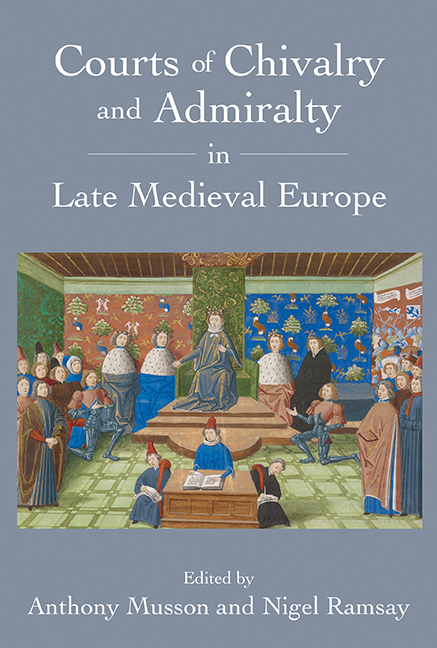Book contents
- Frontmatter
- Contents
- List of Illustrations
- Notes on Contributors
- Preface
- A Note on Editorial Practice
- List of Abbreviations
- Introduction
- Chapter 1 Heralds and the Court of Chivalry: From Collective Memory to Formal Institutions
- Chapter 2 French Armorial Disputes and Controls
- Chapter 3 Art, Objects and Ideas in the Records of the Medieval Court of Chivalry
- Chapter 4 Sir Robert Grosvenor and the Scrope–Grosvenor Controversy
- Chapter 5 From Brittany to the Black Sea: Nicholas Sabraham and English Military Experience in the Fourteenth Century
- Chapter 6 ‘Armed and redy to come to the felde’: Arming for the Judicial Duel in Fifteenth-Century England
- Chapter 7 The Jurisdiction of the Constable and Marshals of France in the Later Middle Ages
- Chapter 8 The Origins and Jurisdiction of the English Court of Admiralty in the Fourteenth Century
- Chapter 9 The Consulate of the Sea and its Fortunes in Late Medieval Mediterranean Countries
- Chapter 10 The Admiralty and Constableship of England in the Later Fifteenth Century: The Operation and Development of these Offices, 1462–85, under Richard, Duke of Gloucester and King of England
- Chapter 11 Some Dubious Beliefs about Medieval Prize Law
- index
Chapter 1 - Heralds and the Court of Chivalry: From Collective Memory to Formal Institutions
Published online by Cambridge University Press: 28 June 2018
- Frontmatter
- Contents
- List of Illustrations
- Notes on Contributors
- Preface
- A Note on Editorial Practice
- List of Abbreviations
- Introduction
- Chapter 1 Heralds and the Court of Chivalry: From Collective Memory to Formal Institutions
- Chapter 2 French Armorial Disputes and Controls
- Chapter 3 Art, Objects and Ideas in the Records of the Medieval Court of Chivalry
- Chapter 4 Sir Robert Grosvenor and the Scrope–Grosvenor Controversy
- Chapter 5 From Brittany to the Black Sea: Nicholas Sabraham and English Military Experience in the Fourteenth Century
- Chapter 6 ‘Armed and redy to come to the felde’: Arming for the Judicial Duel in Fifteenth-Century England
- Chapter 7 The Jurisdiction of the Constable and Marshals of France in the Later Middle Ages
- Chapter 8 The Origins and Jurisdiction of the English Court of Admiralty in the Fourteenth Century
- Chapter 9 The Consulate of the Sea and its Fortunes in Late Medieval Mediterranean Countries
- Chapter 10 The Admiralty and Constableship of England in the Later Fifteenth Century: The Operation and Development of these Offices, 1462–85, under Richard, Duke of Gloucester and King of England
- Chapter 11 Some Dubious Beliefs about Medieval Prize Law
- index
Summary
The Court of Chivalry lies at the heart of the present volume, and two cases among the relatively few of which we have record stand out. They are Scrope v. Grosvenor and Lovell v. Morley, which, as Maurice Keen pointed out long ago, give us a real insight into the thought processes and attitudes of the knights of the period, as well as a vivid sense of how heraldry was much more ubiquitous than we had perhaps imagined. They have been much studied, but there are still surprises to be found. When I discovered that Nigel Ramsay was working on the cases in the Court of Chivalry, I sent him some transcripts I had commissioned, and got the following email back:
You will be tickled when I say that last week, when out at Kew checking the section that you commissioned and so very kindly sent me, of the proceedings in the case Lovell v. Morley, I noticed that a contemporary marginal annotator (presumably one of the commissioners who was assessing each deponent's value) had put beside the paragraph with the statement of John Suffolk herald the damning comment: ‘no[n] ho[mo] gent[ilis]’!
‘Not a gentleman!’ There is a wonderful Victorian snobbery about the remark, as if John Suffolk had been put up for a London club; one can see the author of this remark quizzing the list of candidates through his monocle, and letting it fall in horror at the discovery. And it is made all the more powerful by the fact that John Suffolk is the only herald recorded as testifying in the Court of Chivalry before 1400.
The early status of heralds
Seriously, however, it is useful confirmation of something that I think needs to be revisited, namely the question of the early status of heralds and the point at which they actually acquire authority over armorial matters. With all due respect to historians of heraldry before 1400, I think we have perhaps overvalued the status of heralds from the twelfth to the fourteenth centuries. Anthony Wagner, the doyen of such studies, is indeed very cautious about what we can know, as is Noel Denholm-Young with regard to the heralds’ authority to adjudicate in disputes over arms or even over subordinate heralds and minstrels
- Type
- Chapter
- Information
- Courts of Chivalry and Admiralty in Late Medieval Europe , pp. 15 - 28Publisher: Boydell & BrewerPrint publication year: 2018



